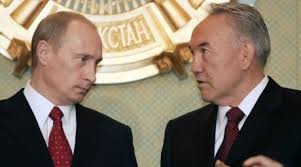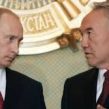
Crisis in Crimea: Will Kazakhstan Be Next?
Publication: Eurasia Daily Monitor Volume: 11 Issue: 48
By:

Moscow’s military intervention in Crimea and the peninsula’s upcoming March 16 referendum on whether to leave Ukraine and join Russia has caused muted official reaction in Central Asia. Nonetheless, Russia’s actions in Ukraine is particularly closely followed across the region. And the Kremlin’s justification for using force in Crimea—namely to protect ethnic Russians living there—has put Central Asian leaders on alert.
In March, the foreign ministries of Kazakhstan and Uzbekistan both issued carefully worded statements on Ukraine, expressing their concern but without mentioning Russia. “Kazakhstan is deeply concerned with the current developments in Ukraine,” the Kazakhstani foreign ministry said. “Further escalation of tensions may lead to unpredictable consequences at both regional and global levels” (mfa.kz, March 3). According to Uzbekistan’s Ministry of Foreign Affairs, events in Ukraine create “real threats to sovereignty and territorial integrity of the country [which] cannot but arouse a deep alarm and concern in Uzbekistan” (mfa.uz, March 4).
All five post-Soviet Central Asian republics—Kazakhstan, Kyrgyzstan, Tajikistan, Turkmenistan and Uzbekistan—are home to varying numbers of ethnic Russians. Therefore, Moscow’s rationale for troop deployments in a former Soviet republic to supposedly protect its Russian population could easily also be applied to any of the Central Asian states. The Kremlin seems to be setting just such a precedent in Ukraine by violating the 1994 Budapest Memorandum, which provided security assurances to Kyiv in exchange for it giving up Soviet-era nuclear weapons deployed on Ukraine’s territory (see EDM, March 10). Twenty years ago, Russia, the United States and the United Kingdom provided such security assurances to Ukraine, Belarus and Kazakhstan—requiring all to give up their Soviet nuclear stockpiles in exchange for assured territorial integrity and political independence.
Should Moscow’s policy of violating its neighbors’ sovereignty under the pretext of protecting Russians abroad expand beyond Russia’s actions in Georgia in 2008 and in Ukraine now (see EDM, February 28, March 4), Kazakhstan would be a logical next target. It shares a common border with Russia, stretching over 7,591 kilometers (4,716 miles), the longest continuous land border in the world. And according to the last census, carried out in 2009, Kazakhstan’s ethnic-Russian minority numbered 3,793,764 (23.7 percent of the total population), (https://www1.unece.org/stat/platform/download/attachments/64881183/Kaz2009%20Analytical%20report.pdf?version=1&modificationDate=1330590038432&api=v2).
Hence, on March 10, President Nursultan Nazarbayev surprised many when he told Russian President Vladimir Putin during a telephone conversation that Kazakhstan, “as a strategic partner [of Moscow], understands Russia’s stance on the protection of the rights of national minorities in Ukraine and its security interests.” Yet, he also called for a “peaceful regulation of the crisis in Ukraine on the basis of the preservation of Ukraine’s sovereignty [within] the norms of international law” (akorda.kz, March 10).
Speaking to Germany’s Chancellor Angela Merkel on the phone the same day, Nazarbayev used stronger words. He “acknowledged the importance of a diplomatic solution to the crisis in Ukraine through dialogue between all interested parties, the use of possible mechanisms of international mediation to assure the territorial integrity of this country, and the rejection of mutual threats and ultimatums” (akorda.kz, March 10).
Nazarbayev’s seeming endorsement of Putin’s policy goes beyond the statements of support for Moscow he made in 2008 around the time of the war between Russia and Georgia (https://archive.kremlin.ru/eng/text/speeches/2008/08/28/2031_type82914_205851.shtml), says Dosym Satpayev, a political scientist and director of the Risk Assessment Group in Almaty. The outcome of the August 2008 war was Moscow’s formal recognition of Georgia’s breakaway territories of Abkhazia and South Ossetia as independent—although Astana never recognized them as independent states (Author’s interview, March 12).
The recent developments in Ukraine have had greater resonance in Kazakhstan than those in the Caucasus six years ago. Today, the potential political consequences for Astana are far more considerable. Nazarbayev has to walk a thin line—taking Kazakhstan’s own ethnic-Russian population into account, without alienating the country’s ethnic Kazakhs. At the same time, he runs the risk that Moscow might gladly misinterpret his words of support for Putin as a carte blanche for further interference abroad (Author’s interview, March 12).
Last month, two Russian nationalist politicians already made territorial claims on Kazakhstan, triggering separate protest notes from the Kazakhstani authorities. One of them, Vladimir Zhirinovsky, the leader of Russia’s Liberal Democratic Party, called for the creation a “Central Asian Federal Region” within Russia, with its administrative capital being “Verny”—the former Tsarist Russian name for Almaty, Kazakhstan’s largest city (see EDM, February 27).
Public opinion in Kazakhstan is divided on events in Crimea. People in the northern part of Kazakhstan, where most ethnic Russians live, receive their information from Russian news outlets and accept the Russian spin as truth, says Satpayev. They believe that extremists have taken over the government in Ukraine, at the expense of the local Russian population, and worry that the same could happen in Kazakhstan (Author’s interview, March 12).
Sergei Duvanov, an independent political analyst, says that the Soviet ideology once instilled in people still lives on. To a large degree, post-Soviet societies, including in Kazakhstan, still lack the ability to think independently and continue to view the world in a particular way, Duyanov argues (Respublika, March 10). This mentality has resurfaced particularly among ethnic Russians in Kazakhstan, as they fear Kazakh nationalism and worry about their personal wellbeing following a change of power, he says. This can create an unhealthy atmosphere of distrust and suspicion in the country.
The best way for Kazakhstan to maintain its sovereignty is to avoid giving Moscow any reasons for taking antagonistic steps, says Nargis Kassenova, the director of the Central Asian Research Center at KIMEP University in Almaty. To reduce Kazakhstan’s vulnerability, both domestically and externally, a highly sensible policy regarding inter-ethnic relations is needed, as well as an improvement in governance. Russian-driven Eurasian integration efforts that erode Kazakhstan’s sovereignty without offering any development perspectives should be stopped, she says (vlast.kz, March 11)
Although Russia’s occupation of Crimea currently dominates the thinking of analysts in Kazakhstan and Central Asia as a whole, the overthrow of Viktor Yanukovych itself offers plenty of food for thought. In a region where elections almost never approach Western standards of freedom and fairness, it is a reminder that growing popular dissatisfaction can lead to rapid and unexpected regime change once citizens begin protesting in large numbers in central public places. Kyrgyzstan, the political exception in the region, has experienced this twice in the last few years.




